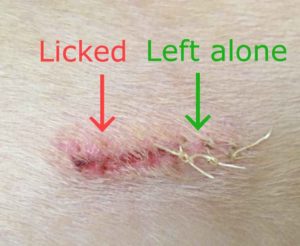This page lists the ways your vet can help your dog or cat stop scratching, licking and chewing their skin. Please also read our pages on:
- Effective home remedies for itchy dogs
- The causes of itching in dogs and cats
- An 8-step plan for treating itchy dogs
Here’s what vets can do, starting with the simplest and often the most important.
Prevention of Self-Trauma

Once a dog or cat has an itchy spot, they are irresistibly attracted to it. If you don’t quickly break the itch-scratch-lick cycle the skin will get worse and worse, until it becomes infected. Ask your vet for methods suitable for your pet.
These will often be used together with the following skin treatments.
Ointments & Creams
Good for:
- Preventing small areas of inflammation from spreading or getting infected
- Dogs & cats very sensitive to side effects of systemic treatments
- Spot-treatment to allow reduction in systemic doses
Not good for:
- Areas with hair. Sparsely haired or clipped areas are best
- Any area that can be licked. These often worsen if cream is used
- Broken skin
Medicated Shampoos & Washes
Good for:
- Every dog. All should benefit from a wash chosen carefully with your vet
- Fungal infections (Malaseb, Sebazole), bacterial infections (Pyohex, Pyoderm S), soothing skin (Aloveen, Epi-Soothe)
Not good for:
- Cats. Very few tolerate washing
Read more here about how often to bath your dog
Lotions & Sprays
Good for:
- Topical treatment of haired areas
- Treating larger areas (some are not absorbed systemically)
- Dogs & cats very sensitive to side effects of systemic treatments
Not good for:
- Treatment for longer than seven days
- Broken skin
Prescription Skin Foods
This page explains diets for food allergy and dermatitis.
Good for:
- Dogs with food allergies
- Additional skin support for all itchy dogs
Not good for:
- Pets sensitive to diet change
- Animals with strict dietary requirements
Antibiotics
Antibiotics are essential for secondary bacterial infection called pyoderma. This is a feature of many other skin problems. You can read about skin infections in dogs here.
Antihistamines
Click here for antihistamine doses for dogs
Good for:
- Some cases of allergy and hypersensitivity
- Dogs & cats very sensitive to side effects of systemic cortisone
- Treatment on a budget
Not good for:
- Patients needing stronger or more reliable treatments
Cortisone (prednisolone, dexamethasone etc)
Good for:
- Widespread and severe dermatitis
- Sudden flare-ups
- Treatment on a budget
Not good for:
- Continuous use (intermittent use or every second day better)
- Dogs & cats very sensitive to side effects of systemic cortisone
- Animals at risk of diabetes, cushings disease, obesity, pancreatitis
- Animals with infections
Read more about the use & side effects of prednisolone in dogs and cats here.
Cyclosporin (Atopica®)
Atopica was one of our first alternatives to prednisolone. We hardly use it any more in dogs (due to the next two medicines) but it’s still a useful drug for cats. Read more about Atopica here.
Good for:
- Atopy and autoimmune diseases without cortisone side effects
- Animals at risk of diabetes, cushings disease, obesity, pancreatitis
- Animals prone to infections
- Dogs and cats
Not good for:
- Treatment on a budget
Oclacitinib (Apoquel®)
Apoquel is a tablet given once a day that inhibits inflammatory messenger proteins. You can read about the pros and cons of Apoquel here.
Good for:
- Control of atopic dermatitis without cortisone side effects
- Animals at risk of diabetes, cushings disease, obesity, pancreatitis
- Animals prone to infections
- Dogs only
Not good for:
- Treatment on a budget
- Cats (not suitable)
Lokivetmab (Cytopoint®)
Cytopoint is a monthly injection of a monoclonal antibody against interleukin-31. It is very similar in pros and cons to Apoquel but is much longer acting. Dogs only.
Read more about when to use Cytopoint here.
Allergy Testing & Referral
Adelaide vet skin specialists can be found on this page. Good for:
- Owners keen to try to identify a cause
- A chance of a complete cure of allergies
Not good for:
- Treatment on a budget
